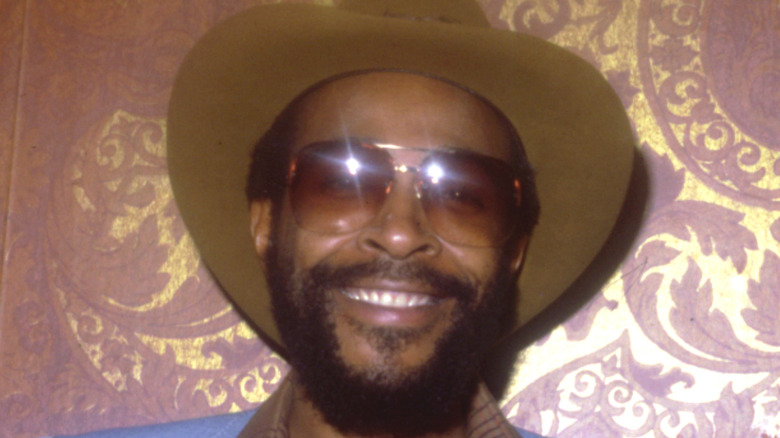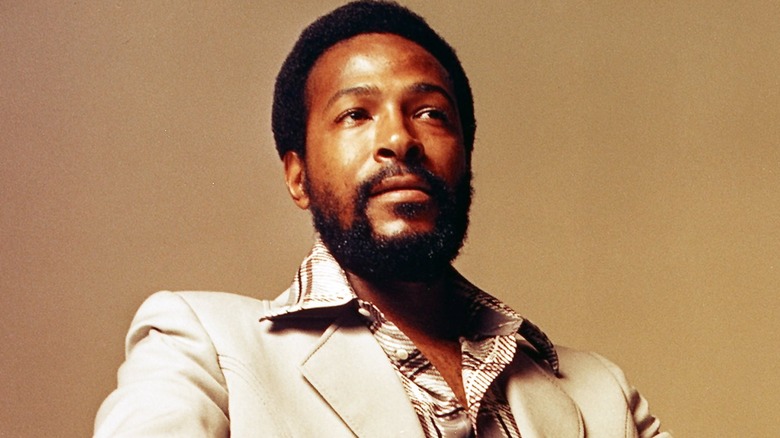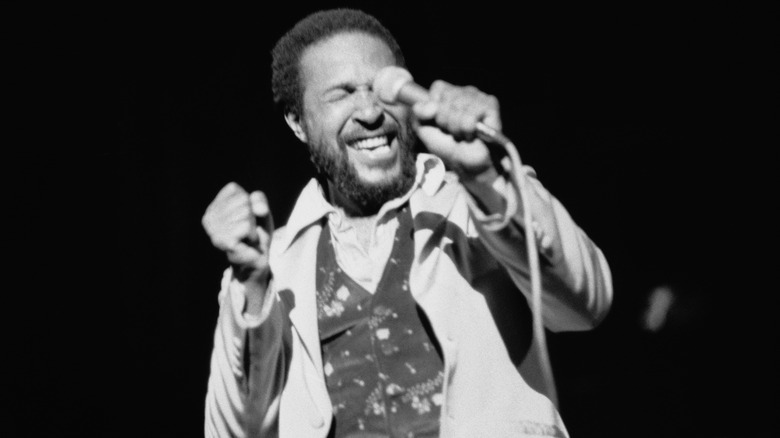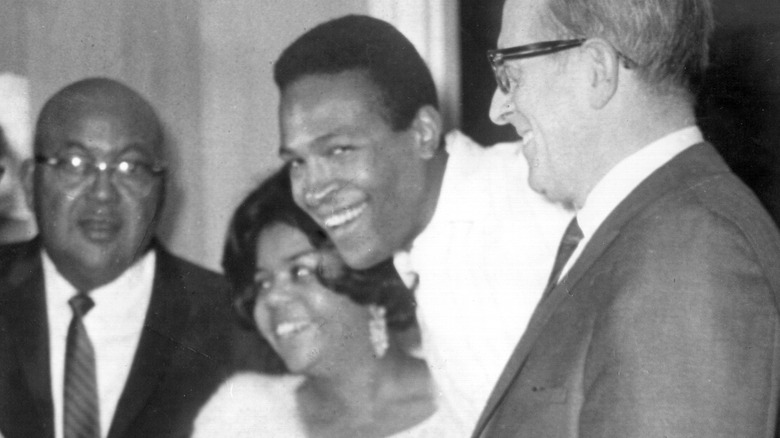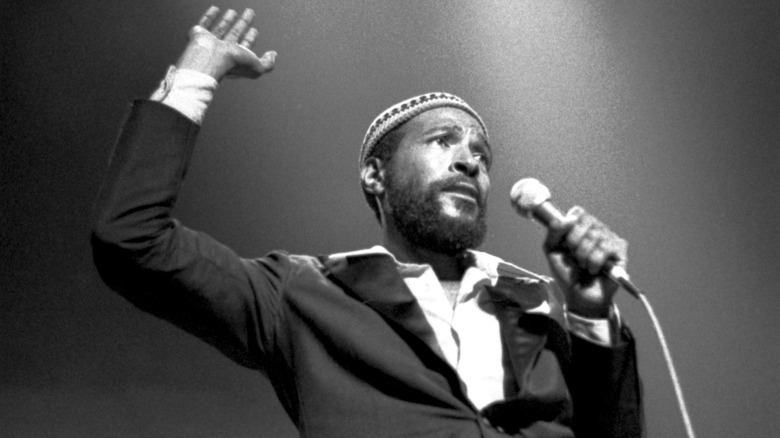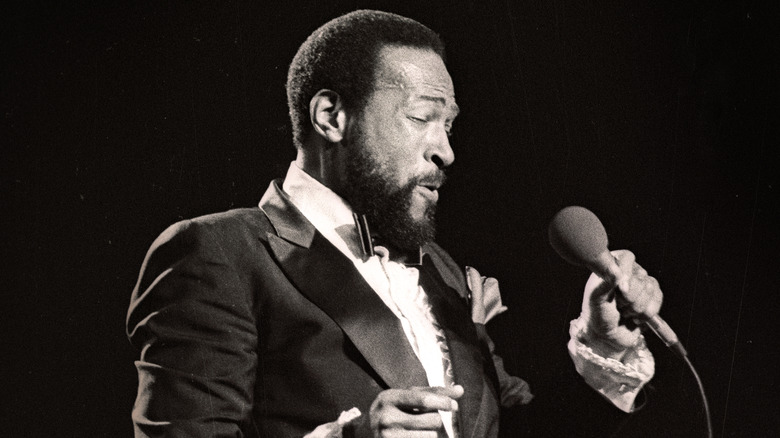Why Marvin Gaye Filed For Bankruptcy
It's very hard for any kind of musician to be a relevant performer in three decades or more, but Marvin Gaye did that. In the 1960s, he was one of Motown Records' mainstays, best known for songs like "I Heard it Through the Grapevine" as well as his duets with Tammi Terrell. The '70s saw him hit it big with socially-conscious songs like "What's Going On?" and sensual love ballads like "Let's Get it On." And in the '80s, "Sexual Healing" almost continued where "Let's Get it On" left off, proving that even if he'd been making hits for a good two decades at that point, Gaye was still capable of attracting new fans while keeping most of the old ones.
Though he was unquestionably a success with fans, record buyers, and critics alike, Gaye also dealt with a plethora of personal demons, including drug addiction, depression, and domestic abuse allegations. He also had a contentious relationship with his father, who acted abusively toward him well into his adulthood, with things coming to a head when Marvin Pentz Gay Sr. fatally shot his namesake son in April 1984. Apart from those issues, Gaye's later career saw him so burdened by debt that he ended up filing for bankruptcy in the 1970s.
Diminishing musical returns
The 1970s got off on a rough note for Marvin Gaye, as his singing partner Tammi Terrell died in March 1970 at the age of 24. Quite understandably, he fell into a personal and creative funk after Terrell's death, though it wasn't long before he was (unsuccessfully) trying out for the NFL's Detroit Lions and working on what would arguably turn out to be his magnum opus, the 1971 album "What's Going On?" Two years later, he released yet another instant classic in "Let's Get it On," and once again, its title track went on to become one of Gaye's biggest and most memorable hits. Then came another three-year wait before Gaye put out his next album, "I Want You."
If you're only a casual fan and don't recognize the title of that album (or its title track), you'd be forgiven, as "I Want You," despite performing solidly on the charts, was not a critical darling like its two immediate predecessors. In its review of the album, AllMusic described "I Want You" as a "sharp change in direction," as Gaye made the transition from soul to disco, a change in sound that critics of the era weren't prepared for. For one, Rolling Stone was not a fan of the production, which the publication felt was "too pleasant, low-keyed and subtle for its own good," as well as Gaye's vocals, which it deemed too laid-back and passive.
Gaye's drug use was allegedly escalating
Most sources note that Marvin Gaye's drug use reached critical mass in the late '70s — after he filed for bankruptcy. But the singer had been doing drugs for most of his adult life at that point, and he had even referenced it in one of his early '70s songs. "Flyin' High (In The Friendly Sky)," from "What's Going On?," was apparently inspired by much more than the United Airlines slogan, though it should be noted that at the time he wrote the song, marijuana was still his recreational drug of choice.
There aren't any available ballpark figures that tell us how much Gaye was spending on drugs in the lead-up to his bankruptcy. What we do know about Gaye and his history of substance abuse is that it progressively escalated throughout the '70s, with The Guardian writing that the increasing cost of his cocaine habit was among the driving factors that forced him to file for bankruptcy in 1976. His biographer, David Ritz, also wrote about a "growing reliance on drugs as anti-depressants" around the time "I Want You" was released.
The drugs were one thing, but there was one specific factor that played a larger role in Gaye's decision to file for bankruptcy.
If you or anyone you know is struggling with addiction issues, help is available. Visit the Substance Abuse and Mental Health Services Administration website or contact SAMHSA's National Helpline at 1-800-662-HELP (4357).
Alimony payments were eating into Gaye's earnings as a musician
When Marvin Gaye met Anna Gordy, the sister of Motown founder Berry Gordy, in 1960, he was only in his early 20s, while she was a good 17 years older. The age difference didn't prevent them from hitting it off, and in 1963, the two were married. Unfortunately, it was quite a troubled marriage, as Gaye admitted to David Ritz (via Rolling Stone). "There was tremendous love between us, and tremendous need for one another," the singer said. "But I couldn't be controlled –- not by a wife, not by a manager, not by a record company. I was born a ram and a rebel." In 1975, Anna Gordy Gaye would file for divorce after 12 years of marriage.
One year later, the alimony payments were just too expensive for Gaye to keep paying. Allegedly owing $600,000 to his ex-wife and unable to pay back taxes, the legendary crooner filed for bankruptcy. He agreed to pay Anna the money he owed, with the settlement stipulating that the first $307,000 would be an advance payment coming from the royalties from the next album he'd release; the remaining $293,000 would come from subsequent royalties off future albums. It wasn't the most ideal place to be in, and the generally messy divorce proceedings weren't helping, but it didn't take long for Gaye to find inspiration for the album that would help satisfy those alimony payments.
Here, My Dear was a flop with critics and record buyers
Originally, the project that would later be known as "Here, My Dear" was meant to be a "quickie" record. As quoted by Album Liner Notes, Marvin Gaye told Ritz that he didn't want to exert so much effort on the album, considering how "Anna was going to wind up with the money anyway." But he wrote several songs that expressed the heartbreak he felt over his divorce, a heartbreak evident in song titles such as "When Did You Stop Loving Me, When Did I Stop Loving You." Then again, the lyrics of "You Can Leave, But It's Going to Cost You," with the title line sung in Anna's point of view, hint at some bitterness over having to sacrifice a substantial chunk of his royalties in order to pay his debts. And that was just one example of why "Here, My Dear" could also be considered a "revenge" album against Anna Gordy.
"Here, My Dear" was released in 1978 as a double album — a truly ambitious project for any artist. But while critics like Robert Christgau admired Gaye's honesty and the album's "documentary charm," he opined that the record was not the most commercially palatable and that it was "definitely a weird one." His largely positive review, however, was more of an outlier, as critics were mostly harsh toward "Here, My Dear." It was also a flop with record buyers, going no higher than No. 26 on the Billboard 200 — a far cry from the top 10 peak positions of "What's Going On?," "Let's Get it On," and "I Want You."
He still owed a lot of money at the time of his death
Marvin Gaye died on April 1, 1984, just one day shy of his 45th birthday, after he was shot by his father during an argument. Shortly before his death, Gaye was enjoying a career renaissance of sorts, thanks to the success of his 1982 hit "Sexual Healing," but he was also deep in his drug addiction and dealing with paranoia and depression (via the Chicago Tribune). Little had changed in the lead-up to his death, and that also applied to the massive debt that had been piling up for years.
According to Trust Counsel, Gaye was $9.2 million in debt at the time of his passing, with close to half of that ($4.5 million) owed to the I.R.S. In fact, the only significant asset he truly owned was his intellectual property, and he also didn't leave behind a will — that meant his three children were set to inherit equal shares of his fortune, but only after the government and his other creditors collected the money that he owed. But the fact that Gaye's children inherited the rights to his intellectual property also meant a financially secure life for all three of them, and then some. Case in point — the $5.3 million plagiarism case where the Gaye family prevailed against Robin Thicke and Pharrell Williams, who were accused of ripping off Gaye's 1977 classic "Got to Give it Up" for their 2013 mega-hit "Blurred Lines."
